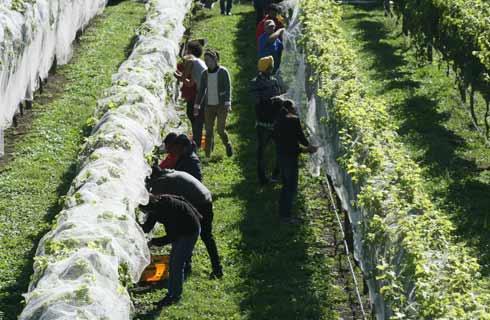植物与环境科学哲学博士
Doctor of Philosophy in Plant and Environmental Sciences

学历文凭
Ph.D.

专业院系
Plant and Environmental Sciences

开学时间

课程时长

课程学费

国际学生入学条件
IDP—雅思考试联合主办方

雅思考试总分
6.5
- 雅思总分:6.5
- 托福网考总分:79
- 托福笔试总分:550
- 其他语言考试:Duolingo - overall score 105
CRICOS代码:
申请截止日期: 请与IDP联系 以获取详细信息。
课程简介
More than ever, we are linked in an interconnected world: both in agriculture and sustainability of environmental systems. The department has programs in<br>plant sciences,<br>environmental science,<br>soil science,<br>water management,<br>natural resources management and<br>turf management.<br>Students trained in these areas are in demand for U.S. and international positions. This demand is at all levels of training–BS, MS, and Ph.D. Therefore, the course work and original research in Plant and Environmental Sciences leading to the Master of Science and Doctor of Philosophy are designed for and have proven to be successful in preparing students for commercial companies, educational institutions, governmental agencies and private production enterprises.<br><br>The student may emphasize study in several discipline areas described in the following pages.<br><br>The agronomy section emphasizes sustainable crop production, plant-pest/disease/weed interactions, soil-water-plant relations, crop physiology, and breeding and genetics of cotton, alfalfa, maize and peanuts.<br>The genetics section places special emphasis on genetic basis of agronomic or horticultural traits, applied bioinformatics, gene regulation and genomics.<br>The environmental and soil science sections emphasize environmental quality and ecosystem services, bioremediation, recycling of organic wastes and wastewater, water use efficiency, soil-plant relations, soil-geomorphology and desert ecology, and the fertility, chemistry, physics, and microbiology of soils, including forest soils.<br>The horticulture section emphasizes the creative use of plants by humans, and studies on the technical advancements in the husbandry of most economic commodity groups of fruits, vegetables, or ornamentals as well as managed turf. Emphasis may be in breeding and genetics of chile or onions, plant growth and development, nutrition, dormancy and cold hardiness, plant stress (water and/or salinity) response, fruit and vegetable physiology, forestry, and turfgrass.
相关申请
 预科
预科 奖学金
奖学金 实习机会
实习机会 在校学习
在校学习 跨境学习
跨境学习 校园授课-线上开始
校园授课-线上开始 在线/远程学习
在线/远程学习
开学时间&学费
学费信息仅供参考,请与IDP联系以获取详细信息
| 开学时间 | 时长 | 学费 | 地点 |
|---|
学校排名

世界排名601
数据源:
泰晤士高等教育世界大学排名
关于新墨西哥州立大学

新墨西哥州立大学是一所历史悠久的公立大学,成立于1888年,主校区位于新墨西哥州的拉斯库鲁斯(New Mexico, Las Cruces),是“大陆法案大学”( land-grant university)之一。最早创立时候名为拉斯库鲁斯学院(Las Cruces College), 是一所农业学院。1889年更名为“New Mexico College of Agriculture and Mechanic Arts”。总计有2.64万学生(2005年数据), 师生比是1:19。NMSU所设的学科,包括农科、生物科学、商科管理,大众传播及艺术、计算机及自然科学,教育、工程及环境设计、健康专业、社会科学等。
本校相关课程

机械工程哲学博士
学历文凭
Ph.D.
开学日期
课程费用总额


机械工程理学硕士
学历文凭
Masters Degree
开学日期
课程费用总额


Doctor of Philosophy in Electrical Engineering
学历文凭
Ph.D.
开学日期
课程费用总额


Master of Science in Electrical Engineering
学历文凭
Masters Degree
开学日期
课程费用总额


土木工程理学硕士
学历文凭
Masters Degree
开学日期
课程费用总额


化学工程博士学位
学历文凭
Ph.D.
开学日期
课程费用总额

其他相关课程

植物科学哲学博士
 曼尼托巴大学
曼尼托巴大学学历文凭
Ph.D.
开学日期
课程费用总额


植物科学理学硕士
 曼尼托巴大学
曼尼托巴大学学历文凭
Masters Degree
开学日期
课程费用总额


植物科学理学硕士
 不列颠哥伦比亚大学
不列颠哥伦比亚大学学历文凭
Masters Degree
开学日期
课程费用总额


植物科学哲学博士
 不列颠哥伦比亚大学
不列颠哥伦比亚大学学历文凭
Ph.D.
开学日期
课程费用总额


安大略大学花艺设计证书
 圣力嘉学院
圣力嘉学院学历文凭
Bachelor Degree
开学日期
课程费用总额


植物健康园艺学学士学位
 昆特仑理工大学
昆特仑理工大学学历文凭
Bachelor Degree
开学日期
课程费用总额










 美国
美国